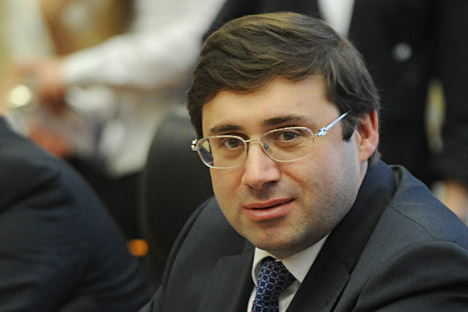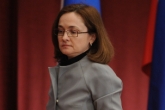Central Bank now mega financial market regulator in Russia

First deputy chairman Sergei Shvetsov (photo) was appointed to head a new Russian financial market mega regulator. Source: Itar-Tass
On September 1, the Central Bank of the Russian Federation became the country’s financial market mega regulator due to the transfer of the number of functions previously performed by the Federal Financial Markets Service (FFMS).
In addition to its supervision of the commercial banks, the function of a single regulator includes monitoring of non-banking financial institutions, including insurance companies, asset management companies, pension funds, brokers and exchange intermediaries as well as microfinance institutions. As a result, the high standards that exist in the banking sector will spread to areas like micro-finance institutions.
The new agency is headed by the first deputy chairman Sergei Shvetsov – the ideologist behind the creation of a dual currency basket floating corridor – a tool, launched in 2009. According to him, the changes due to the transfer of the Central Bank’s functions will not be dramatic and will be quite slow. The main thing is the synergy effect from the merger of the two structures.
The idea of creating a financial mega-regulator in Russia has been discussed during the last seven years. It had both supporters and opponents, who believed that they do not need to create a single agency, but to define the powers of existing regulators better by changing the legislation. The mega-organization’s supporters are not united either: their disagreement arose while deciding which agency would handle this role. The first option discussed was the FFMS, which is already controlling the stock and insurance markets. However, the authorities chose the Central Bank, which has accumulated a lot of experience supervising banks.
As a result, in December last year, the government decided to integrate the FFMS into the Central Bank, allocating a year and a half to two years to the amalgamation process.
Experts generally view the creation of a single supervisory body positively. According to the chief economist of Deutsche Bank Russia Yaroslav Lisovolik, the establishment of a mega regulator is a positive factor for the Russian economy and fits into the general trend of regulatory changes of the leading financial markets. For example, the European Central Bank is gradually gaining more and more power. “With conditions whereby various segments of the market are interconnected, consistency and prompt action are important to resolve the crisis,” Lisovolik said. In his opinion, the FFMS did not have enough opportunities to solve all the problems in areas where it was a regulator. As for the stock market, according to Lisovolik, their response is generally restrained. “Some investors fear that the Central Bank will be less focused on a flexible exchange rate and inflation targeting,” he said. For foreign investors the pros and cons of creating a mega regulator will become apparent only after some time, but now they, like the Russian participants in the market, are hoping that the Central Bank, being a mega regulator can solve some of the issues on reforms faster. According to Lisovolik, due to several decision-making centres, some reforms such as the introduction of Euroclear calculations were previously moving too slowly.
“In my opinion, the introduction of a mega regulator will have a positive impact on the financial markets. Previously, the Central Bank had built a regulatory system for banks, which includes, inter alia, controlling of economic indicators to give a timely response to the worsening of the financial situation of credit institutions. Banking capital requirements were also developed,” Elena Bukina, head of the Absolut Bank’s internal control said. “Rather, a system of indicators will not damage the rest of the market players either, including microfinance institutions, and will make the business more transparent.”
According to Bukina, “the creation of a mega regulation institution can minimize systemic risk, improve the protection level of investors and depositors,” which is likely to have a positive impact on the Russian economy. She adds that the creation of a mega regulator will promote the growth of Russia’s investment attractiveness as it will increase the business’s transparency and predictability.
According to Geoffrey Nicholson, partner of PricewaterhouseCoopers Russia BV, Russia is following the path of many developed countries, who have united their regulators to avoid some of the problems associated with insufficient and fragmentary regulation that existed before the 2008 crisis. “For foreign investors, it will be a signal similar to the adoption of IFRS and the accession to the WTO and the Basel agreement, that Russia wants to be a full and modern member of the world financial and commercial economy,” Nicholson said.
According to the managing partner of the IC Third Rome Andrei Movchan, the creation of a single regulator fully fits into an actively implementable idea of the power vertical. The advantages of multiple regulators, according to him, consist of each one them having its own policies, its own initiative. “For example, the U.S. Federal Reserve System is a canvas mosaic; each bank has its own policy.” In Russia, however, even when there are multiple regulators, they have no independence, so their existence does not give any advantages to the financial markets. Therefore, for Russia, according to Movchan, the amalgamation of regulators is rather an advantage, since it is easier to manage a single organization, it costs less.
All rights reserved by Rossiyskaya Gazeta.
Subscribe
to our newsletter!
Get the week's best stories straight to your inbox
